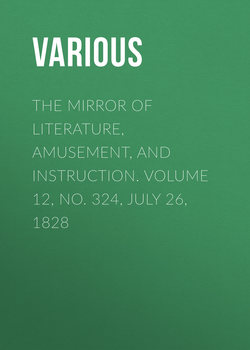The Mirror of Literature, Amusement, and Instruction. Volume 12, No. 324, July 26, 1828

Реклама. ООО «ЛитРес», ИНН: 7719571260.
Оглавление
Various. The Mirror of Literature, Amusement, and Instruction. Volume 12, No. 324, July 26, 1828
KINGSTON NEW BRIDGE
ARCHBISHOPS OF CANTERBURY
DAYS OF FLY FISHING
SHROPSHIRE AND WELSH GIRLS
COLEBROOK-DALE IRON-WORKS—THE REYNOLDS'
NOTES OF A READER
THE SKETCH BOOK
SPIRIT OF THE PUBLIC JOURNALS
Retrospective Gleanings
The Anecdote Gallery
THE GATHERER
ADVANTAGES OF LOQUACITY
Отрывок из книги
The first Archbishop of Canterbury was Austin, appointed by King Ethelbert, on his conversion to Christianity, about the year 598. Before the coming of the Saxons into England, the Christian Britons had three Archbishops, viz. of London, York, and Caerleon, an ancient city of South Wales. The Britons being driven out of these parts, the Archbishoprick of London became extinct; and when Pope Gregory the Great had afterwards sent thither Augustine, and his fellow-labourer to preach the Gospel to the then heathen Saxons, the Archiepiscopal See was planted at Canterbury, as being the metropolis of the kingdom of Kent, where King Ethelbert had received the same St. Augustine, and with his kingdom was baptized, and embraced the doctrines of Christianity before the rest of the Heptarchy. The other Archbishoprick of Caerleon was translated to St. David's in Pembrokeshire, and afterwards wholly to the See of Canterbury; since which, all England and Wales reckon but two Archbishops, Canterbury and York. The following Archbishops have died at Lambeth Palace;—Wittlesey, in 1375; Kemp, 1453; Dean, 1504; all buried in Canterbury Cathedral: Cardinal Pole, 1558, after lying in state here 40 days was buried at Canterbury; Parker, 1575, buried in Lambeth Chapel; Whitgift, 1604, buried at Croydon; Bancroft, 1610, buried at Lambeth; Juxon, 1663, buried in the chapel of St. John's College, Oxford; Sheldon, 1667, buried at Croydon; Tillotson, 1694, buried in the church of St. Laurence Jewry, London; Tennison, 1715; and Potter, 1747, both buried at Croydon; Seeker, 1768; Cornwallis, 1783, and Moore, 1805, all buried at Lambeth. In 1381, the Archbishop, Simon of Sudbury, fell a victim to Wat Tyler and his crew, when they attacked Lambeth Palace.
P. T. W.
.....
Gay's passionate love for angling is well known; it was his principal occupation in the summer at Amesbury; and "the late excellent John Tobin, author of the Honey Moon, was an ardent angler." Among heroes, Trajan was fond of angling. Nelson was a good fly-fisher, and continued the pursuit even with his left hand; and, says the author, "I have known a person who fished with him at Merton, in the Wandle. Dr. Paley was so much attached to this amusement, that when the Bishop of Durham inquired of him when one of his most important works would be finished, he said, with great simplicity and good-humour, 'My lord, I shall work steadily at it when the fly-fishing season is over.'"—Then we have a poetical description of river scenery, till two of the party arrive at the following conclusions:—
I have already admitted the danger of analyzing, too closely, the moral character of any of our field sports; yet I think it cannot be doubted that the nervous system of fish, and cold-blooded animals in general, is less sensitive than that of warm-blooded animals. The hook usually is fixed in the cartilaginous part of the mouth, where there are no nerves; and a proof that the sufferings of a hooked fish cannot be great is found in the circumstance, that though a trout has been hooked and played for some minutes, he will often, after his escape with the artificial fly in his mouth, take the natural fly, and feed as if nothing had happened; having apparently learnt only from the experiment, that the artificial fly is not proper for food. And I have caught pikes with four or five hooks in their mouths, and tackle which they had broken only a few minutes before; and the hooks seemed to have had no other effect than that of serving as a sort of sauce piquante, urging them to seize another morsel of the same kind.—The advocates for a favourite pursuit never want sophisms to defend it. I have even heard it asserted, that a hare enjoys being hunted. Yet I will allow that fly-fishing, after your vindication, appears amongst the least cruel of field sports.
.....